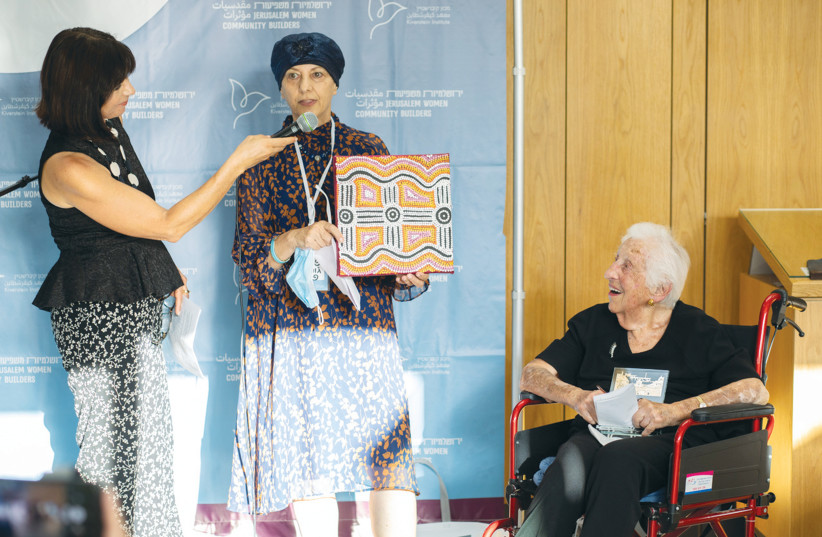Israeli professor, Jewish feminism educator Alice Shalvi dies at 96
Alice Shalvi, the feminist trailblazer died on Monday, two weeks short of her 97th birthday.
An educator and powerful orator, albeit not of the fire and brimstone variety, Shalvi, with her cultured British accent, her measured tones and her perfect sense of logic, inspired generations of women – particularly native English speakers, to stand up for their rights and to fight to realize their potential.
She was inspirational not only in the spoken word, but also in the written word.
Together with her late husband Moshe, she wrote the Encyclopedia of Jewish Women which features thousands of thumbnail and longer biographies as well as thematic essays illustrating the diverse talents and achievements of Jewish women, many of whom proved their mettle long before feminism was in vogue.
Shalvi was not the first woman in Israel to draw attention to women’s rights for equal education and equal opportunities in academia, political parties and the workforce, but she was one of the most effective, partially because of obstacles she encountered in her own career, and partially due to her flexibility of thought and action. She was open to new ideas, and open to change. She believed in dialogue, and she was always ready to take on new challenges.

One such challenge was taking on the role of founding director of the Israel Women’s Network, established in 1984 in the wake of the US-Israel dialogue, held at Jerusalem’s King David Hotel and sponsored by the American Jewish Congress. As director, Shalvi was also IWN’s spokeswoman, lobbying members of Knesset, addressing pressconferences,representing IWN at overseas conventions and initiating research and projects for benefit of women.
The life of Alice Shalvi
Born in Germany to an affluent, Orthodox Jewish family, she and her brother moved with their parents to England in 1934, after the family home in Germany had been searched by Nazis.
Unlike many other German Jews, Shalvi’s parents Benzion and Perl Margulies read the writing on the wall, and acted promptly.
Always an ardent Zionist, Shalvi, while still an English literature student at Cambridge University, was sent to the 22nd Zionist Congress in Basel. The year was 1946, and after listening to all the deliberations, the young woman who was there as the representative of British Jewish students, returned to London, determined to move to the Jewish homeland. But first, she completed her studies at Cambridge, and then earned a degree in social work at the London School of Economics.
Arriving in Israel in 1949, she was accepted as a faculty member in the English Department of the Hebrew University, and while a teacher was also a student, working towards her Ph.D.
She met her American-born husband a few months after settling in Jerusalem, and they married in October that year, which was also the month of her birthday.
Moshe Shalvi died ten years ago.
As an educator, Alice Shalvi taught English literature at both the Hebrew University and Ben Gurion University of the Negev. She was the founder of the Pelech experimental school for religious girls in Jerusalem where not only secular studies were made available to them, but also Talmud, which was almost unheard of in the Israel of the 1970s and 1980s .
Today, there are many opportunities in Jerusalem and beyond, for both religious and secular girls to study Talmud and other holy texts which were once a solely male domain. Some of the female students actually surpass male counterparts in their knowledge and their ability to interpret the various texts.
Shalvi later served as a rector of the Schechter Institute of Jewish Studies, by which time she had been embracing pluralistic Judaism for some years.
The change in attitude had come about when she was on a speaking engagement in the United States, where she had been invited to attend services at a Conservative synagogue. Wishing to honor her, Shalvi’s hosts arranged for her to be called to the Torah. She was already in her 50s at the time, and had never previously touched the parchment on which the Torah is written. The realization stirred something within her, causing her to think about what Jewish girls were missing as both a spiritual and learning experience.
Shalvi remained in demand as a speaker for most of her life. Some two years ago, she wrote her autobiography under the title Never a Native. Her accent, when she spoke Hebrew, always betrayed her. Even though she was held in such great esteem for her advocacy that she was awarded the Israel Prize, Shalvi always felt herself to be an alien – first in her native Germany, then in England, and finally in Israel where she lived for more than seventy years.
That is very sad, considering that she had her foot in so many doors and had influenced so much change in the status of women. Among her many initiatives and achievements was the funding of the Aguna Coalition whose mission it was to find a means of releasing women from marriage when their husbands refused to give them a religious Bill of Divorce.
Many immigrants who never lost the accent of the old country, can identify with the feeling of forever being an alien.
Nonetheless, she produced a sabra tribe.
She is survived by five of her six children, 21 grandchildren, and 26 great-grandchildren, which is quite a legacy for someone who escaped Nazi Germany in time.





Comments are closed.